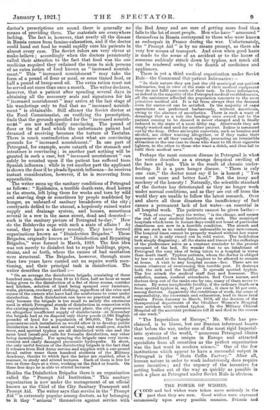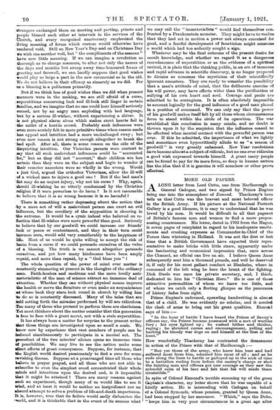THE POWER OF WISHES.
GOOD and bad wishes were taken more seriously in the past than they are now. Good wishes were expressed ceremonially upon every possible occasion. Friends and 'strangers exchanged them on meeting and parting, priests and people blessed each other at intervals in the services of the 'Church, and every recognized anniversary emphasized the .living meaning of forms which oustom would otherwise have 'rendered void. Still on New Year's Day and on Christmas Day we wish one another well, but " the compliments of the seasons " have now little meaning. If we can imagine a revolution so thorough as to change manners, to alter not only the names of 'the days and months but sweep away time-honoured forms of _,greeting and farewell, we can hardly suppose that good wishes -would play so large a part in the new ceremonial as in the old. We do not believe in their efficacy as sincerely as we did. For as a blessing is a politeness primarily.
But if we think less of good wishes than we did when present manners were in the making, we are still afraid of a curse, r superstitions concerning luck and still linger in certain -few:lilies, and we imagine that no one could hear himself seriously cursed, not by an angry man exploding with bad language, but by a serious ill-wisher, without experiencing a shiver. It is not physical alarm alone which makes stout hearts fail in =the midst of a hostile crowd. Probably such influences were :even more acutely felt in more primitive-times when reason made -less appeal and intuition had a more unchallenged sway ; but -even now reason is not strong enough altogether -to break the -bad spell. After all, -there is some reason on the side of-the `disquieting intuition. Our Victorian parents were content to my that all such malevolent influences could be " accounted ibar," but as they did not " account," their children are leas -pertain than they were on-the subject and begin to wonder if their remoter ancestors were so wholly in the wrong. Would just God, argued the orthodox Victorians, allow the ill-will of a wicked man to injure a good one ? But if the bad man's ;fist may do an unjust injury, why not his curse ? Why, again, _should ill-wishing be so utterly condemned by the- Christian religion if it were powerless to do harm ? Is it not reasonable to believe that it is so wrong because itis so harmful ?
There is something rather depressing about the notion that (by -a mere act of will a malevolent person can exert an evil influence, but the corollary of the supposition is cheering in the extreme. It would be a cynic indeed who believed on re- Section that ill-wishes were more, powerful than good. Seriously to believe that by our goodwill we could increase our friends' .luck or peace or contentment, and they in their turn could increase ours, would add very considerably to the happiness of fife. Most of us would be quite willing to accept the risk of harm from a curse if we could persuade ourselves of the value of a blessing. The truth is we cannot altogether persuade ourselves, and yet how many kindnesses have been amply repaid, and more than repaid, by • a " God bless you " I The whole question of the power of mind over matter is constantly simmering at present in the thoughts of the ordinary man. Faith-healers and mediums and the• more loudly anti- materialistic of the men of science attract an immense deal of attention. Whether they can without physical means improve the health or move the furniture or even make an acquaintance at whose back they stare look round in church by willing him to do so is constantly discussed. 'Many of the tales that are Mold setting forth the miracles performed by will are ridiculous. Too many of those who pretend to perform them are charlatans. -Yet most thinkers-about the matter consider that this generation Is face to face with a great secret, not with a stale superstition.
It has always been a matter for surprise to the present writer that these things are investigated upon so -small a scale. We know now by experience that vast numbers of people can be -Induced simultaneously to participate in a mental act. The -preoedent of the two minutes' silence opens an immense vista of possibilities. We may live to see the nation make some Idlent efforts of great consequence. Suppose, for instance, that the English world desired passionately to find a cure for some ravishing disease. Suppose at a prearranged time all those who believe in prayer prayed, and all those who are not able to subscribe to oven the simplest creed concentrated their whole
minds and intentions upon the desired end, is it impossible that it might be attained ? There are many reasons against such an experiment, though many of us would like to see it tried, and at least it would be neither an insignificant nor an absurd attempt to solve a problem of life-and-death importance.
It is, however, true that its failure would sadly dishearten the tworld. and it is thinkable that in the event of its success what
we may call the "immaterialists "- would find themselves con. fronted by a Frankenstein monster. They might have to realize that they had set in _motion .a power not always exercised for good, and a. fearful .development of fanaticism might consume a world which had too-ardently sought a sign.
Whatever may be the final outcome of the present desire for occult knowledge, and whether we regard it as a dangerous recrudescence of superstition or as the- evidence of a spiritual revival, it is plain that the thinking public, in an era of immense and rapid-advance -in scientific discovery, is no longer prepared to dismiss as nonsense the mysticism of their scientifically ignorant ancestors. They are-ready to-consider the possibility that a man's attitude of mind, that- the deliberate exercise of his will power, may have effects wider than the purification or sullying of his own heart and soul. Courage and panic are admitted to be contagious. It is often absolutely impossible to account logically for the good influence of a good man placed in a position of command. We can only- say that the power of his goodwill makes itself felt by all those whom circumstances force to stand within the circle of its operation. The war established this conclusion in many minds, and no doubt is thrown upon it by the suspicion that the influence ceased to be effectual when mental contact with the powerful person was over. If this be admitted, the importance of what we lightly and sometimes even hypocritically allude to as " a season of goodwill ".is very -greatly enhanced. New Year resolutions have become almost& subject of ridicule, but no oneever ridicules a. good wish expressed towards -himself. A great many people can be found to pay for its mere form,- so deep in human nature lies the idea that if it is genuine it will somehow or other prove effectual.











































 Previous page
Previous page